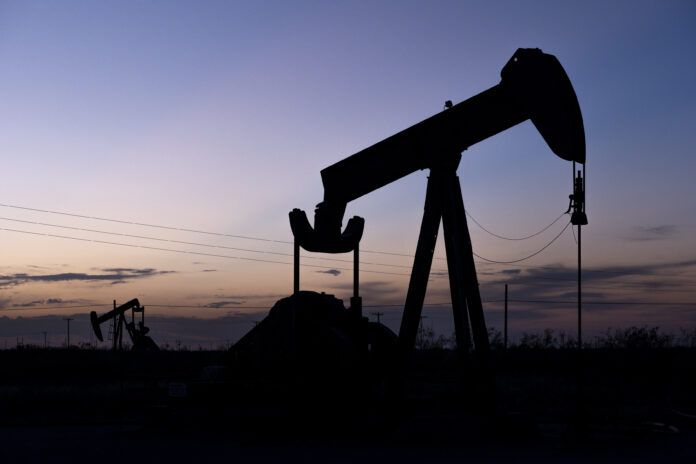
There are varying degrees of danger for the global energy industry in the world’s four big hot spots and it’s an edgy experience to watch them and wonder which one will blow up first.
They are the war between Russia and Ukraine, the Israel-Hamas war and the possible intervention of Iran, missile attacks by the Houthi terrorists on shipping in the Red Sea and the oil-related territorial dispute between Venezuela and Guyana.
Odessa oilman Kirk Edwards, State Rep. Brooks Landgraf and Waco economist Ray Perryman say any one of them could affect the worldwide market and the Permian Basin.

“It is interesting with all the many geopolitical events going on in the world how each can differently affect our oil and natural gas prices here domestically,” Edwards said. “Take for instance the Russia-Ukraine war.
“The biggest implication since the war started was the natural gas that Russia was supplying to Europe. Suddenly a huge amount of that gas was taken off the market, but low and behold here comes the United States and our vast ability to make liquified natural gas and come to the rescue, which we have.”
If that market had not been available to American producers, U.S. natural gas prices would be even worse than what they are today, Edwards said.
“Oil areas like Iran and Saudi Arabia can be immensely affected by ongoing conflicts there, too,” he said. “If Iran does anything against Israel, the oil price could dramatically rise and Israel and the U.S. would immediately act against Iran’s biggest revenue generator, which is their massive ability to export oil.
“All these areas have their consequences both for higher and lower oil and gas prices depending upon the outcome. We as domestic producers try and work our budgets in a certain oil and gas price range and luckily we can use hedging instruments to lock in those returns for a certain period till things tide over back to a more normal situation.
“But in all my years, conflict and uncertainty seem to be more the norm across this world.”
Landgraf said America’s path to energy stability in the face of foreign wars and geopolitical tensions lies within the Permian Basin.

“Our region with its vast reserves and production capabilities provides us with the means to protect ourselves from the unpredictability of global markets and to ensure that energy remains affordable for all Americans,” the Odessa Republican said. “By leveraging our own domestic resources we can effectively cushion the impacts of international disruptions and secure a stable energy supply for our nation.”
But to fully realize that potential it is essential that the federal and state governments avoid imposing unnecessary regulatory burdens on the energy industry, Landgraf said.
“The fact that our energy future is within our own hands is both reassuring and a call to action,” he said. “This reality highlights the critical need to support and protect the Permian Basin.
“That’s why I am fully committed to passing Texas STRONG legislation designed to support transportation infrastructure, workforce and economic development, public education, healthcare and public safety in the regions of our state with the highest oil and gas production.
“Through this effort the Permian Basin and other oil- and gas-producing areas can fulfill their promise of economic growth, prosperity and American energy independence for generations to come.”
Perryman said the primary factor determining the extent of the effect of various geopolitical hotspots on the oil market is how severe and-or widespread the conflicts become.

“Much of the impact of the Russia-Ukraine war has already likely been absorbed with many of the countries that formerly purchased Russian oil and natural gas ceasing those purchases after the invasion,” Perryman said. “However, Russia is still selling to some nations, which is adding to global supplies.
“If the Russian oil and gas infrastructure were damaged due to a major escalation in the conflict with Ukraine, there would clearly be market fallout but less than there would be otherwise given that Russian petroleum is already essentially off Western markets.”
He said the Venezuela-Guyana dispute is somewhat less likely to have a major effect.
“Venezuelan production is well below what it was 10 years ago, although it has been rising slowly more recently and Guyana is still developing,” Perryman said. “Although Venezuela accounts for almost one-fourth of total OPEC-Plus reserves, given the situation there the share of production is far smaller than it might be and it is notoriously inefficient.
“The production in those two countries is significant and will be more so in the future, but a disruption would likely be less of a factor in the global market.”
He said the areas with the greatest potential for a major disruption center are in the Middle East.
“OPEC member countries produce about 40 percent of the world’s oil and represent about 60 percent of the total petroleum traded internationally,” he said. “As the largest exporter in OPEC Saudi Arabia is particularly important to global supplies and prices and it usually maintains some spare capacity in reserve for potential market management, which could help during a crisis elsewhere.”
Perryman said oil prices would spike if a conflict in the Middle East escalated to the point where OPEC production in the region was threatened.
“Although a Houthi missile might affect some portion of oil on shipping lanes, it would take a major flurry of issues to have a major effect,” he said. “The bottom line is that the biggest driver of a price spike as I see it would be if the Israel-Gaza conflict spilled over to involve Iran and affected Saudi Arabia or disrupted the major OPEC producers in the region in some other fashion.
“That is not a likely scenario, but it can’t be dismissed entirely. It is just basic math that if you have multiple areas of potential risk, the probability of something happening somewhere goes up even if their individual risks are relatively low.”



